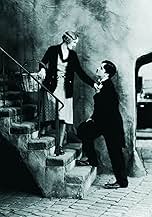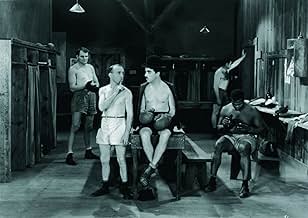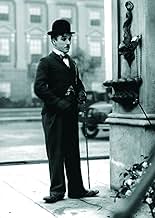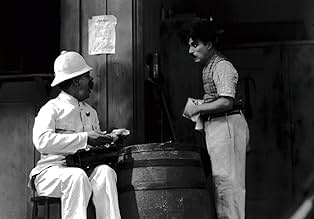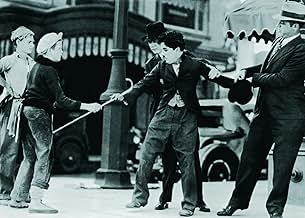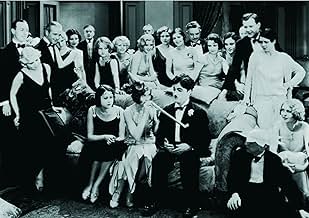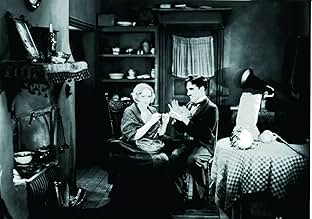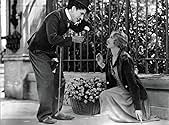Charlot vagabond vient en aide à une jeune fleuriste aveugle et se fait passer pour un homme riche. A force de travail il réunit assez d'argent pour que la jeune fille recouvre la vue.Charlot vagabond vient en aide à une jeune fleuriste aveugle et se fait passer pour un homme riche. A force de travail il réunit assez d'argent pour que la jeune fille recouvre la vue.Charlot vagabond vient en aide à une jeune fleuriste aveugle et se fait passer pour un homme riche. A force de travail il réunit assez d'argent pour que la jeune fille recouvre la vue.
- Réalisation
- Scénario
- Casting principal
- Récompenses
- 6 victoires au total
Charles Chaplin
- A Tramp
- (as Charlie Chaplin)
Al Ernest Garcia
- The Millionaire's Butler
- (as Allan Garcia)
Johnny Aber
- Newsboy
- (non crédité)
Jack Alexander
- Boxing Match Spectator
- (non crédité)
T.S. Alexander
- Doctor
- (non crédité)
Victor Alexander
- Superstitious Boxer
- (non crédité)
Albert Austin
- Street Sweeper
- (non crédité)
- …
Harry Ayers
- Cop
- (non crédité)
Eddie Baker
- Boxing Fight Referee
- (non crédité)
Henry Bergman
- Mayor
- (non crédité)
- …
Edward Biby
- Nightclub Patron
- (non crédité)
Betty Blair
- Woman at Center of Table in Restaurant
- (non crédité)
Buster Brodie
- Bald Party Guest
- (non crédité)
Jeanne Carpenter
- Diner in Restaurant
- (non crédité)
Résumé
Reviewers say 'City Lights' is celebrated for its blend of comedy and pathos, showcasing Charlie Chaplin's iconic Tramp character in a poignant love story with a blind flower girl. The film is praised for its masterful physical comedy, expressive acting, and memorable scenes, particularly the boxing match and the emotional finale. Chaplin's direction, composition of the score, and the film's historical significance are frequently highlighted. However, some reviewers note that the silent format and slow pacing may challenge modern audiences. The themes of love, selflessness, and social commentary resonate deeply, making 'City Lights' a timeless classic.
Avis à la une
Charlie Chaplin's "City Lights" contains a blend of humor and humanity that make it memorable for everyone who watches it. Although made very much in the old-fashioned silent film tradition, much of it is timeless, too.
After a few minutes of slapstick at the beginning, Charlie's "little tramp" character makes two acquaintances. He meets a blind girl selling flowers, who mistakes him for a rich man, and the two become very fond of each other. Then he meets a real millionaire, who is drunk, depressed, and about to commit suicide. In a comic scene, the tramp persuades the millionaire not to go through with it, making himself a devoted friend.
The tramp soon learns that there is an operation that could give the girl her sight, and tries to think of some way he could help. His scenes with the girl and her grandmother are moving, while his determination to help lead him into some comic escapades - his attempt to win money in a boxing match being particularly funny, and one of Chaplin's best comic pieces. Meanwhile, when his millionaire friend is drunk, he dotes on the tramp, but when sober he forgets who the tramp is, leading to more amusing scenes and occasional trouble for Charlie.
All of the comedy leads up to a finale that is one of the best-remembered scenes in any film. "City Lights" shows the power of the camera in the hands of a master, who without words can move his audience or make them laugh. Anyone who appreciates good cinema should see it at least once.
After a few minutes of slapstick at the beginning, Charlie's "little tramp" character makes two acquaintances. He meets a blind girl selling flowers, who mistakes him for a rich man, and the two become very fond of each other. Then he meets a real millionaire, who is drunk, depressed, and about to commit suicide. In a comic scene, the tramp persuades the millionaire not to go through with it, making himself a devoted friend.
The tramp soon learns that there is an operation that could give the girl her sight, and tries to think of some way he could help. His scenes with the girl and her grandmother are moving, while his determination to help lead him into some comic escapades - his attempt to win money in a boxing match being particularly funny, and one of Chaplin's best comic pieces. Meanwhile, when his millionaire friend is drunk, he dotes on the tramp, but when sober he forgets who the tramp is, leading to more amusing scenes and occasional trouble for Charlie.
All of the comedy leads up to a finale that is one of the best-remembered scenes in any film. "City Lights" shows the power of the camera in the hands of a master, who without words can move his audience or make them laugh. Anyone who appreciates good cinema should see it at least once.
As always the little tramp is fleeing the long arm of the law when he is mistaken for a wealthy man by a blind girl selling flowers by the roadside. While he longs to help her the tramp knows he cannot. However when he is at his lowest he stumbles upon a drunken man who he helps out who may be able to help him in turn if the two of them can sober up long enough.
In response to seeing some modern trash posing as "comedies" recently (Little Man, Norbit, Pluto Nash I'm looking at you) I decided to check out some comedies that have stood the test of time a few Chaplin films being among them. City Lights is one of those film that you will think you have seen even when you have not. I knew I had never actually seen it but the wonderful opening scene on the statue and the scenario of the blind girl by the side of the road were very familiar to me and I was right into it from the start. As was often the case, this film has a thin narrative but one that allows for several scenarios for Chaplin to work his magic. And so he does with some classic sequences across the whole film.
The statue scene is memorable for how he makes so much out of so little but the brilliant choreography of the boxing match had me rolling with laughter as it moved so beautifully and imaginatively around the ring. Chaplin is a master and this is just one of many films that shows it as he creates a great little clown that we care about but can also laugh at. His support do no more than that support him but yet they are also roundly good. Cherrill provides attractive heart despite her simple character, while Myers, Garcia, Mann and a few others do good physical work alongside Chaplin.
City Lights is a really great film that is all the more impressive for still feeling fresh and funny more than seventy years after it was made. The simple narrative is the frame but it is the wonderful and frequent set-pieces that tickle and also stick in the mind. So tonight you might be looking at your film queue with lots of modern comedies but it is worth bumping this classic to the top of the list instead.
In response to seeing some modern trash posing as "comedies" recently (Little Man, Norbit, Pluto Nash I'm looking at you) I decided to check out some comedies that have stood the test of time a few Chaplin films being among them. City Lights is one of those film that you will think you have seen even when you have not. I knew I had never actually seen it but the wonderful opening scene on the statue and the scenario of the blind girl by the side of the road were very familiar to me and I was right into it from the start. As was often the case, this film has a thin narrative but one that allows for several scenarios for Chaplin to work his magic. And so he does with some classic sequences across the whole film.
The statue scene is memorable for how he makes so much out of so little but the brilliant choreography of the boxing match had me rolling with laughter as it moved so beautifully and imaginatively around the ring. Chaplin is a master and this is just one of many films that shows it as he creates a great little clown that we care about but can also laugh at. His support do no more than that support him but yet they are also roundly good. Cherrill provides attractive heart despite her simple character, while Myers, Garcia, Mann and a few others do good physical work alongside Chaplin.
City Lights is a really great film that is all the more impressive for still feeling fresh and funny more than seventy years after it was made. The simple narrative is the frame but it is the wonderful and frequent set-pieces that tickle and also stick in the mind. So tonight you might be looking at your film queue with lots of modern comedies but it is worth bumping this classic to the top of the list instead.
Once again Chaplin plays his famous creation, the beloved Tramp
The noble Little Fellow meets and falls in love with a blind flower girl
She assumes he is wealthy man and offers him a flower, which he attentively accepts with his last penny
One night by chance he rescues a drunken millionaire from drowning The rich gentleman becomes a generous friend when drunk but doesn't recognize the tramp when sober Chaplin takes the blind girl under his wing, and takes flight with the millionaire's money to cure her blindness
"City Lights" engaged a true genius in a graceful and touching performance which arouses profound feelings and joy with great simplicity of style and tragic tale Each scene was the result of hard-working detail and planning
One night by chance he rescues a drunken millionaire from drowning The rich gentleman becomes a generous friend when drunk but doesn't recognize the tramp when sober Chaplin takes the blind girl under his wing, and takes flight with the millionaire's money to cure her blindness
"City Lights" engaged a true genius in a graceful and touching performance which arouses profound feelings and joy with great simplicity of style and tragic tale Each scene was the result of hard-working detail and planning
City Lights is simply put one of the best movies out there. Every scene is classic and had a huge impact on the history of film-making. Chaplin's last 'silent' film tells the story of a poor little man the tramp played by Chaplin who falls in love with a blind flower girl. He becomes friends with a wealthy man who constantly tries to commit suicide. The man only recognizes the tramp character when he is drunk. To impress the flower girl the tramp uses the man's wealth to make her fall in love with him. The only problem is that when the man is sober he doesn't recognize the tramp anymore. On top of this the flower girl has to pay 22 dollars of rent or she will be thrown out of her apartment. Now the tramp desperately seeks for jobs in the city to help his love. Out of this simple plot great comedy and heart breaking moments come forth.
The outcome of the movie is to almost all people known. It is regarded as one of the best endings ever taped on film. The movie itself still is masterpiece more than 70 years after it's release. I personally rate this as Chaplin's second best I have seen so far. My favorite remains The Gold Rush. Still this movie gets 5/5 stars from me.
The outcome of the movie is to almost all people known. It is regarded as one of the best endings ever taped on film. The movie itself still is masterpiece more than 70 years after it's release. I personally rate this as Chaplin's second best I have seen so far. My favorite remains The Gold Rush. Still this movie gets 5/5 stars from me.
Chaplin takes himself a little more seriously in City Lights, and the results are spectacular. The musical score which Chaplin composed for the film was one of the many highlights, and even though Charlie's performance is much more dramatic than usual in some scenes, the hilarious comedy for which he is known and loved is still abundant.
City Lights is so well made that it is one of the very few movies in which the obvious flaws can be gladly overlooked. Yes, you can clearly see the string holding Chaplin up in the sidesplittingly funny boxing scene, but who cares? That is such classic slapstick that little things like that really don't matter. Besides, let's keep in mind that this movie was made seventy years ago.
Chaplin does a phenomenal job in his traditional role of the tramp, and develops a perfectly convincing romantic relationship with the blind flower girl on the sidewalk. His friendship with the drunken rich guy is hilarious, but it also makes a significant comment about the problems of alcohol. This is truly a great film, which should not be forgotten.
City Lights is so well made that it is one of the very few movies in which the obvious flaws can be gladly overlooked. Yes, you can clearly see the string holding Chaplin up in the sidesplittingly funny boxing scene, but who cares? That is such classic slapstick that little things like that really don't matter. Besides, let's keep in mind that this movie was made seventy years ago.
Chaplin does a phenomenal job in his traditional role of the tramp, and develops a perfectly convincing romantic relationship with the blind flower girl on the sidewalk. His friendship with the drunken rich guy is hilarious, but it also makes a significant comment about the problems of alcohol. This is truly a great film, which should not be forgotten.
Le saviez-vous
- AnecdotesChaplin re-shot the scene in which the Little Tramp buys a flower from the blind flower-girl 342 times, as he could not find a satisfactory way of showing that she thought the mute tramp was wealthy.
- Gaffes(at around 50 mins) When the man swallows part of the Tramp's soap and starts spraying bubbles, the tube used to spray the bubbles is clearly visible behind him.
- Citations
The Tramp: You can see now?
A Blind Girl: Yes, I can see now.
- Versions alternativesAbout seven minutes of footage of Georgia Hale playing the flower girl exists and is included in the 2003 DVD release. The footage was shot during a brief period when the actress originally cast to play the character had been fired and replaced with Hale, but Charles Chaplin was forced to resume filming with the original actress due to the amount of film already shot.
- ConnexionsEdited into Histoire(s) du cinéma: Fatale beauté (1994)
Meilleurs choix
Connectez-vous pour évaluer et suivre la liste de favoris afin de recevoir des recommandations personnalisées
Détails
- Date de sortie
- Pays d’origine
- Site officiel
- Langues
- Aussi connu sous le nom de
- Luces de la ciudad
- Lieux de tournage
- Société de production
- Voir plus de crédits d'entreprise sur IMDbPro
Box-office
- Budget
- 1 500 000 $US (estimé)
- Montant brut aux États-Unis et au Canada
- 19 181 $US
- Week-end de sortie aux États-Unis et au Canada
- 9 102 $US
- 8 juil. 2007
- Montant brut mondial
- 55 154 $US
- Durée
- 1h 27min(87 min)
- Couleur
- Mixage
Contribuer à cette page
Suggérer une modification ou ajouter du contenu manquant

